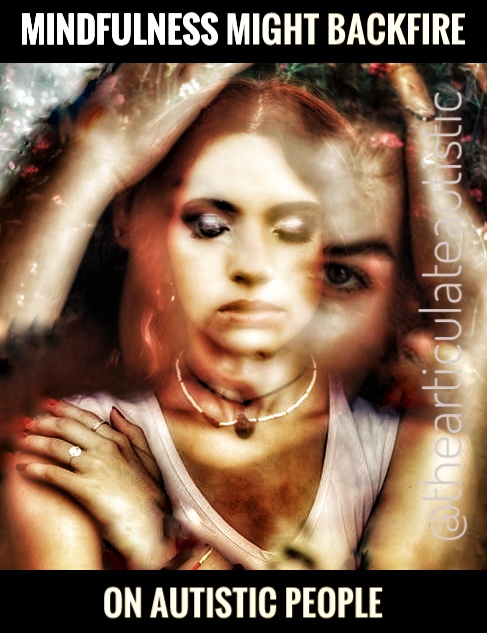Why the Practice of Mindfulness Might Backfire on Autistic People

Like many autistic people, I have always been a highly anxious person. I started having panic attacks at 15 years old, and I’ve probably had PTSD for even longer. Life as an undiagnosed autistic person is traumatizing, full stop.
Living in a world that was too bright, too loud, too itchy, and too confusing meant there was no way I was getting out of childhood without scars and deep ones at that.
I’ve been in therapy since I was 7 years old. Yep, you read that right. The adults in my life were forever trying to figure out what was “wrong with me” as a kid, and I, for my part, was always trying to figure out what was wrong with them.
(Haha! I love that about myself. I was one of those autistics who thought everyone else was messed up, and I was the sane one.)
Anyway, in the course of my lifetime of on-and-off therapy, I’ve been taught and encouraged to practice mindfulness quite often. If you’re not sure what mindfulness practice is, it’s the purposeful attempt to live fully in the moment with all 5 senses tuned in completely to your immediate environment.
This is supposed to center you in the reality of the here and now, reduce anxiety, and help you become more aware of your thoughts, feelings, and sensations.
Here’s why I don’t recommend it for many autistic people:
In order for us to survive in a neurotypical world that, as I mentioned above, is already too loud and overwhelming, we often have to “check out” throughout the day to cope. I call it taking sensory breaks. I just sort of go glassy-eyed and slack-jawed, and it’s like I’ve gone into power save mode. I’m also half in and half out of about a dozen scenarios in my head in a world of my own creation at any given moment. It’s the only way I can live and function in this world without ending up back in the psych ward (I had a nervous breakdown in 2014).
Ergo, since the world is already overwhelming to me, bringing all of that sensory information into sharp relief by focusing on it is usually the last thing I want to do to relieve anxiety.
Let me give you some examples of how I feel when I try to practice mindfulness:
Mindful Eating
When someone suggests mindful eating, they talk about “slowing down and smelling the food, tasting the food, savoring the food, and putting your fork down in between bites”. Oh, dear Lord, the anxiety I feel just typing that!!
Here’s why this doesn’t work for me:
- Smelling food is gross to me.
I’m very sensitive to smells. I don’t smell things before I taste them, and I don’t walk into a room where someone is cooking and say, “Mmmm, that smells good”. I want to avoid the smelling part of eating whenever possible. Even if it does smell good, I don’t like most smells, and I do not go out of my way to breathe them in.
- Tasting food can be triggering to me.
This is probably more a PTSD thing than an autistic thing on my part, but slowing down to taste food can be very triggering for me.
To me, food serves one purpose: To stop me from having the annoying and anxiety-producing physical feeling of hunger.
If it tastes good, awesome, but it’s not my primary focus. Also, it was not my experience as a young person. We were very poor, and we had to eat whatever canned, boxed, or frozen food we could afford, and believe me, it was nothing you wanted to savor.
For other autistic people, the tastes and textures of certain foods can be overwhelming, so we like to avoid that experience, not seek it out. Some of us may be hungry, but we want to get the experience of eating over with as quickly as possible either because of sensory overload or we just want to get back to whatever it is we were doing and once again be temporarily and blissfully unaware that we are living in a needy and demanding body.
- I always feel like I’m starving.
Savoring food? Oh, no. Not for me. Unless it’s dark chocolate, which I will savor, everything goes down my throat with the rapidity of a desperate, starving person who has been wandering the desert for a week. I have tried slowing down and eating mindfully, and it gave me a panic attack. I just can’t do it. Again, in my case, I’m sure that has more to do with trauma than being autistic, but I do know that many autistic people struggle with digestive issues that can result in poor nutritional uptake no matter how good our diets are. I inhale food, and there is no force on the planet that will ever get me to stop. In fact, the more food I have in my mouth at one time, the “safer” I feel. (Not sure how to explain that one, but it’s always been that way with me. Possibly because having physical needs of any kind makes me anxious?)
Where Mindfulness Has Helped Me
Now, there are times when mindfulness actually does help me. For example, I also have OCD, and it can be very helpful to remind myself that I’m in the moment when driving, taking a walk, showering, sipping a cup of tea, etc., when I feel myself becoming anxious about a future event.
Furthermore, when my PTSD has been triggered, mindfulness can help remind me that I’m here and now, not back where I was in the thick of trauma and abuse. I’ve actually used mindfulness techniques such as touching the surface of the chair I’m sitting in and looking around the room to see where I am while repeating, “You’re safe, you’re home. It’s (name year), and you are home” over and over until I can calm down.
The Takeaway
The bottom line with mindfulness practice is I truly believe it is much more suited to neurotypical brains. That said, I’ve had both positive and negative experiences with it depending on how and when I use it.
If you’ve been trying to get your autistic loved one to practice mindfulness or meditation to ease their anxiety, but it’s making them more anxious, what I’ve written here should give you an idea of why that might be happening.
Even if mindfulness, meditation, or other practices have worked for you or other autistic people you know, never force your autistic loved one to use these techniques if they are causing more anxiety. Instead, work together with your loved one to figure out what does comfort and soothe (such as stimming, being alone in a dark room, playing video games to decompress) and honor it.
Even if it seems “unconventional” to you, the ultimate goal is to reduce the anxiety, not conform to standards that don’t work for our neurology, therefore further traumatizing us.



Hi I will be running a mindfulness group for autistic adults i also identify as autistic, but I wanted to ask if you would like to review the slides ive prepared? I would love ur opinion
Sure. I can give them a look. Email me at thearticulateautistic@gmailcom. 🙂
Hi if u can share here would be helpful if its oki
Hi Eva! I wanted to check in to see if you would mind sharing your experiences about running your group. I am a therapist in Austin, Tx working with LGBTIQIA+ young adults and really want to facilitate a group. I am neurotypical so working cross neurptypes is a THING. Anyway, would love to learn more about what you do!
I am autistic and find mindfulness amazing! It helps me with anxiety massively. I guess this is different for everyone.
Hi. I am an autistic adult with severe sensory self regulation issues, as well as having a rare form of debilitating anxiety known as psychogenic mutism(also referred to as selective or situational mutism). For an individual like myself mindfulness practices are overstimulating and therefore harmful more than helpful as is explained in the above writings. However, if you don’t mind my asking, what age was it that you began to attempt mindfulness practices? I only ask because I was an adult when I learned about mindfulness as a possible therapeutic technique for my anxiety disorder. I have had this theory that had I been taught mindfulness in my youth the technique may have assisted in intentionally desensitizing myself as well as calming my anxiety. I’m not even sure if that is possible but I like to believe that if I had been younger, say my daughters age (11), that the practices that don’t help me now would have helped then….
I wanted to say I started hearing about and maybe practicing mindfulness when I was in my early 20s? It always made me uncomfortable.
Autism — mindfulness all depending on your background. I grew up in a very strict army type background where everything you did had to be done yesterday. Time keeping was first and most important all tasks had to be done. By a time given . Sometimes this workt s with autism sometimes it doesn’t but having meditation works on a different level as you set the amount of time you want to listen to the music. Now it’s up to you if you sit listening to this music or do something else like drawing, writing etc: it still works on that level — it still mindfulness. So it all depends on who as taught you how to centre yourself . It can be done with most types of music — I can still hear my grandmother saying dance if you want to, if it helps you feel calmer then it as worked.
Hi…I appreciate you sharing your experience. I have learned Mindfulness with two basic concepts underlying all practice. They are awareness and compassion. Therefore I honour your attempts to become aware but I wonder if you were able to also include the practice of compassion when greeting your experiences? This has been a crucial part of sitting with my own health and anxiety challenges over time you see. But I am aware that we all have different experiences and maybe your compassion is to step away from something that gave you distress eh. Best wishes 🙂